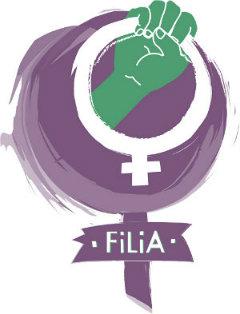
The conference formerly known as Feminism in London is scheduled to start at nine thirty, and to make sure they get everyone there on time, the organisers have booked Cordelia Fine as their keynote speaker. We are told that she has come all the way from Australia specially to tell us about her new book, Testosterone Rex.
But it's not Feminism in London any more- the world is changing, and the UK's biggest feminism conference now bears the name FiLiA, a word meaning 'sister'. Ticket prices are changing, too, which probably accounts for the four hundred attendees who don't quite fill the thousand-seat auditorium to the brim. Not, however, to cast blame on FiLiA- because apart from anything else, it's amazing to share such a huge space with so many like-minded people. It could be a meeting of stick insect collectors, for all that it matters: it's that feeling of unity.
And yet, it does matter. After all, there are almost four hundred women here, and about twenty men. It's a size disparity that feels almost strange; after all, in many situations, it would be the other way around. What the conference does, among other things, is grant all these women the liberty to look how they want to look and say what they want to say without being judged. That's because there's a simple thing everyone here has in common: we all believe in basic gender equality (or at least, I assume this is the case, because not many people who aren't sure where they stand on a subject are willing to pay fifty pounds to go to a conference about it. Just saying.)
The conference runs over the whole weekend, and both days are split into three workshop sections, with breaks in between. You can choose any three workshops to go to. Some are just panels of speakers talking, but sometimes there are questions. Often, the questions people ask say just as much as the panellists do. A woman tells a personal trainer her speech erases the whole idea of fun from exercising; another asks a filmmaker whether a man has ever passed off her work as his own. At one point, a young woman volunteers her friend's experience of working as a journalist and interviewing politicians who groped her underneath the camera.
Obviously, these stories can be depressing- and they often are. But there's something very liberating about the idea of a place where women can come together and feel free to share these experiences. Once, a woman addresses everyone else in the room, saying how, as women, ‘We all know that thing where you say XYZ and everyone just stares at you, and then a man says XYZ and everyone thinks it's brilliant.’ Every woman in the room nods.
At the end of the day, those who have stayed until the end meet again in the main auditorium to see the presentation of the Emma Humphreys Memorial Prize. Emma Humphreys was ‘a writer, campaigner and survivor of male violence who fought an historic struggle to overturn a murder conviction in 1995’, and every year the prize is presented to a woman who is thought to have made a big difference in the struggle against male violence. This year, it is presented to Chlo Winfield, the young woman who set up the Speak Out Project after experiencing abuse in a relationship and recently shaved her head for Rape Crisis.
There's definitely something freeing about attending an event where you can meet people like you, share your thoughts and be able to say ‘I'm a feminist’ without anyone replying ‘Ha ha ha- hairy legs’ (not that anyone ever says ‘I'm a feminist’ at FiLiA. It's taken for granted that you are one.)

